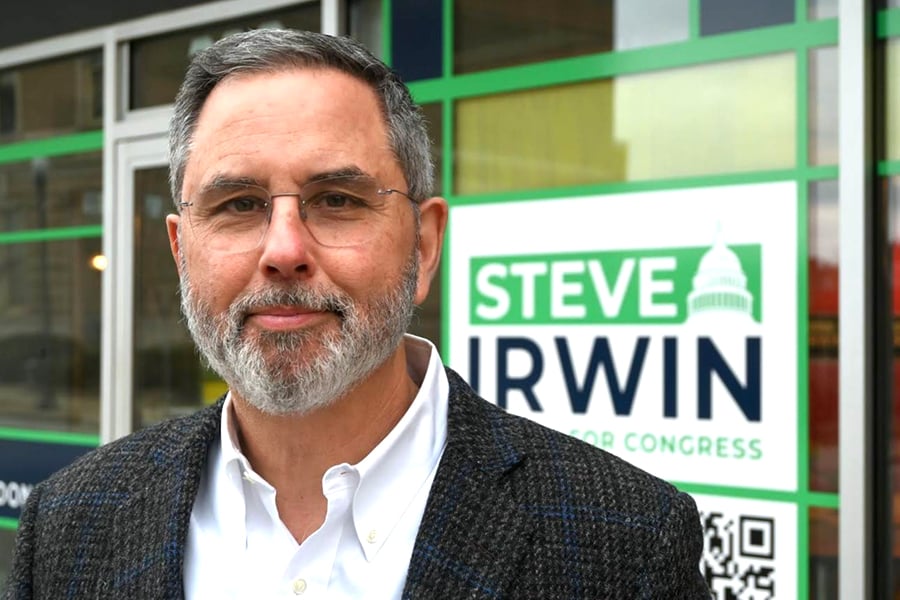

Candidates for Congress often focus their campaigns on local issues — such as roads and bridges that need to be fixed — while working in national themes like inflation. Steve Irwin hopes securities regulation will be a topic that helps connect him to Western Pennsylvania voters.
Irwin, a former Pennsylvania securities commissioner, is running for the state’s 12th District seat, which encompasses Pittsburgh and some of its suburbs. On occasion, investment advisers have launched races for Congress. But it’s rarer for a regulator to jump into the political fray.
Irwin has spent more than 30 years serving at various levels of government, including as an aide to the late Pennsylvania Sen. Arlen Specter, and participating in local Democratic politics. Some of the projects he focuses on on his campaign website, such as working on a light rail transit system, are natural to highlight on the campaign trail.
Although voters may not ask about securities regulation unprompted, that doesn’t mean Irwin can’t make it relevant to them. He frames his regulatory work in terms of protecting seniors from investment frauds and ensuring they can get unbiased advice about their retirement savings.
“That’s something that resonates with people,” Irwin said. “People are looking for someone who understands economics, understands the labor markets, who understands the financial markets, wants to make sure their retirement is a possibility.”
He doesn’t give speeches about his opposition to mandatory arbitration in brokerage and advisory contracts or his support for a fiduciary standard for investment advice. But he brings them up.
“I’ve learned to talk about those issues in a way that people understand how it relates to them,” Irwin said.
His district has strong ties to the financial industry. Pittsburgh is home to PNC Bank, Mellon Bank, BNY Mellon and Federated Investors, for instance. In his law practice, Irwin focused to a large extent on financial regulations.
If he wins in November, Irwin is positioned to be selected by the Democratic caucus to serve on the House Financial Services Committee. From that perch, he could tackle emerging issues like cryptocurrency oversight, which he said lawmakers need to sort out.
“We can’t just kick the crypto can down the road,” he said.
Irwin was appointed as Pennsylvania’s top securities regulatory by former Democratic Gov. Ed Rendell. During his time in office, he became deeply involved with the North American Securities Administrators Association, the umbrella group for state regulators.
Irwin, 62, was instrumental in helping NASAA translate the Dodd-Frank financial reform to the state level. Former Missouri Securities Commissioner Matt Kitzi said Irwin was able to address the interests of a wide variety of people who would be impacted by Dodd-Frank implementation — from investors and regulators to firms raising capital.
“He was fantastic at that,” said Kitzi, a partner at Armstrong Teasdale. “He was reasonable and he brought in a broader perspective.”
Irwin won NASAA’s highest award, the Blue Sky Cube, but was denied the presidency of the group in 2013 when Rendell’s successor as governor, Republican Tom Corbett, removed him as the state’s top securities regulator.
Over his years at NASAA, he left a memorable impression. During NASAA working group meetings at a Baltimore hotel, Irwin also showed his artistic side.
Kitzi said after a grueling session, he walked out in the hall and heard music. He saw Irwin sitting at a piano just minutes after leading detailed discussions about financial regulation.
“He was playing the piano like a professional,” Kitzi said. “I’ve always been a fan of Steve’s. He’s a talented, interesting guy.”
Irwin has been a musician — specializing in the accordion — since childhood and has played in several bands, according to his campaign.
Now he’s trying to add serving as a member of Congress to his eclectic resume. Irwin is running against University of Pittsburgh law professor Jerry Dickinson and Pennsylvania state Rep. Summer Lee in the Democratic primary to succeed incumbent Democrat Mike Doyle, who's retiring.
The winner of the primary will be the prohibitive favorite to win the general election.
Irwin calls himself a progressive Democratic but is trying to carve a path to victory through the middle.
“I am left of center but to the right of the other two people running in the race,” said Irwin, who's been endorsed by Doyle.
The Dickinson and Lee campaigns didn't respond to requests for comment.
Irwin is pitching himself as a candidate with a wide-ranging background who's is ready to lead at a time when the region is facing “unprecedented times” and “existential questions.”
“I have a sense of urgency and vision,” he said. “I looked at who was running and who wasn’t getting in the race. I saw a clear lane for me and an imperative that we get somebody in this position who knows how to get things done and wants to get things done and has a record of getting things done.”

Relationships are key to our business but advisors are often slow to engage in specific activities designed to foster them.

Whichever path you go down, act now while you're still in control.

Pro-bitcoin professionals, however, say the cryptocurrency has ushered in change.

“LPL has evolved significantly over the last decade and still wants to scale up,” says one industry executive.

Survey findings from the Nationwide Retirement Institute offers pearls of planning wisdom from 60- to 65-year-olds, as well as insights into concerns.
Streamline your outreach with Aidentified's AI-driven solutions
This season’s market volatility: Positioning for rate relief, income growth and the AI rebound
